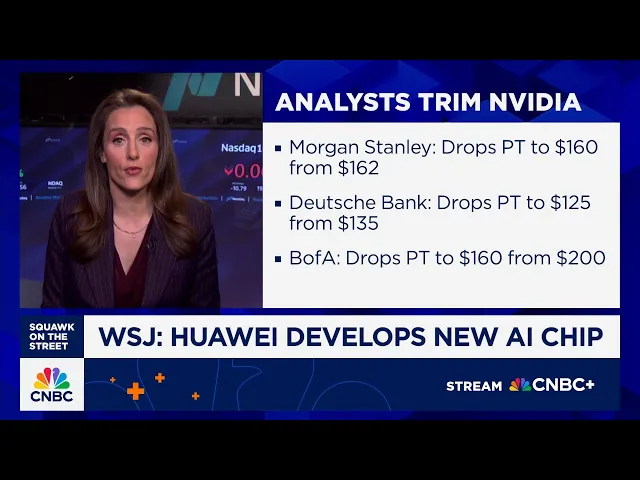Report: Huawei develops new AI chip

Huawei's new AI chip challenges Nvidia's dominance
In a development that signals shifting tectonics in the global AI infrastructure landscape, Chinese tech giant Huawei is reportedly preparing to test its newest and most powerful AI processor. This Ascend 910D chip aims to compete directly with Nvidia's premium offerings, potentially reshaping market dynamics despite years of US trade restrictions and export controls targeting Chinese tech advancement.
Key Points:
-
Innovative system design overcomes restrictions: Despite being blacklisted since 2019 and losing access to advanced chips, Huawei has innovated through system-level design by layering less advanced individual chips to create powerful combined solutions.
-
Performance breakthrough: According to Semi Analysis, Huawei's chip solutions now outperform Nvidia in several key metrics, marking a significant technological achievement for the Chinese company.
-
Financial implications for Nvidia: JP Morgan estimates Nvidia could lose approximately $15-16 billion in 2025 revenue due to US export controls limiting Chinese market access, representing a substantial 13% of their total revenue.
The Sanctions Paradox: When Restrictions Fuel Innovation
The most fascinating aspect of this development is how trade restrictions have inadvertently accelerated Chinese technological self-sufficiency. What began as an American strategy to maintain technological supremacy has instead created a powerful incentive for Chinese companies to develop domestic alternatives. Huawei's planned shipment of over 800,000 chips this year to companies like ByteDance demonstrates this strategy is bearing fruit.
This matters tremendously in the context of global AI infrastructure development. As countries increasingly view AI capabilities as critical to national security and economic competitiveness, the ability to develop advanced AI chips domestically becomes a strategic imperative. The success of Huawei's Ascend processor suggests we're witnessing not just a company overcoming trade barriers, but potentially the emergence of a parallel AI technology ecosystem less dependent on American technology.
Beyond the Technology: Market and Geopolitical Implications
What the CNBC report doesn't fully explore is the potential cascading effect on global technology supply chains. While currently focused on serving the domestic Chinese market, Huawei's chips could eventually find their way to markets in countries maintaining good relationships with China. This includes nations throughout Asia, Africa, and parts
Recent Videos
How To Earn MONEY With Images (No Bullsh*t)
Smart earnings from your image collection In today's digital economy, passive income streams have become increasingly accessible to creators with various skill sets. A recent YouTube video cuts through the hype to explore legitimate ways photographers, designers, and even casual smartphone users can monetize their image collections. The strategies outlined don't rely on unrealistic promises or complicated schemes—instead, they focus on established marketplaces with proven revenue potential for image creators. Key Points Stock photography platforms like Shutterstock, Adobe Stock, and Getty Images remain viable income sources when you understand their specific requirements and optimize your submissions accordingly. Specialized marketplaces focusing...
Oct 3, 2025New SHAPE SHIFTING AI Robot Is Freaking People Out
Liquid robots will change everything In the quiet labs of Carnegie Mellon University, scientists have created something that feels plucked from science fiction—a magnetic slime robot that can transform between liquid and solid states, slipping through tight spaces before reassembling on the other side. This technology, showcased in a recent YouTube video, represents a significant leap beyond traditional robotics into a realm where machines mimic not just animal movements, but their fundamental physical properties. While the internet might be buzzing with dystopian concerns about "shape-shifting terminators," the reality offers far more promising applications that could revolutionize medicine, rescue operations, and...
Oct 3, 2025How To Do Homeless AI Tiktok Trend (Tiktok Homeless AI Tutorial)
AI homeless trend raises ethical concerns In an era where social media trends evolve faster than we can comprehend them, TikTok's "homeless AI" trend has sparked both creative engagement and serious ethical questions. The trend, which involves using AI to transform ordinary photos into images depicting homelessness, has rapidly gained traction across the platform, with creators eagerly jumping on board to showcase their digital transformations. While the technical process is relatively straightforward, the implications of digitally "becoming homeless" for entertainment deserve careful consideration. The video tutorial provides a step-by-step guide on creating these AI-generated images, explaining how users can transform...
